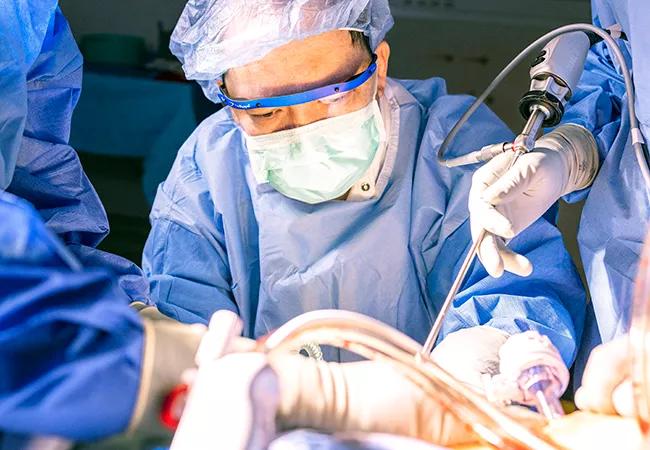Center is among few in Ohio to lead an HIV positive to HIV positive kidney transplant

When a 35-year-old patient with end-stage kidney disease, diabetes and hypertension first presented to Cleveland Clinic, he was on dialysis and had been awaiting transplant on the national kidney transplant list for two years.
Advertisement
Cleveland Clinic is a non-profit academic medical center. Advertising on our site helps support our mission. We do not endorse non-Cleveland Clinic products or services. Policy
The patient, who is HIV positive, knew that living with the infection would make the road to transplant more challenging. He would later discover that a federal policy developed to make organ transplantation more accessible to people living with HIV would shorten his wait time by enabling access to an expanded pool of kidneys for transplant from deceased donors with HIV.
The surgery, which happened at Cleveland Clinic in September 2022 made the center one of the first in Ohio to lead an HIV positive to HIV positive kidney transplant. Dr. Wee credits his colleagues in the Cleveland Clinic Department of Infectious Disease for making it happen.
During peak HIV mortality in the United States, organ transplantation policies were designed to prevent the donation of an organ from a person with HIV. However, as medications have altered the natural history of HIV infection, it’s become widely viewed as a chronic disease, making it much safer to offer eligible HIV positive transplant candidates a potentially lifesaving organ.
And organ transplantation policies have been catching up with this. In recent years, national efforts, such as the HOPE Act, have been underway to improve access to organs for people with HIV.
In 2013, the HOPE Act called for new protocols to guide the transplantation of HIV positive organs into people living with HIV. Cleveland Clinic is one of 30 medical centers in the U.S. that are approved to recover and transplant kidneys from deceased donors with HIV.
The patient had been enrolled for a transplant under the HOPE Act for about a year before being alerted that a kidney was available. Despite this delay, Dr. Wee says, on average, it takes about five to seven years on the national transplant waiting list.
Advertisement
Dr. Wee says the surgery went well — no different from any other kidney transplant surgery. With the new kidney, the patient no longer needs dialysis, has fewer dietary restrictions, and reports feeling more energetic.
Importantly, now that the groundwork has been established, the center is primed to enroll more HIV patients with renal failure for this lifesaving procedure.
“If we’re going to change the life of even one person, all this work is worth it,” says Dr. Wee. "So it’s important we lay out all this groundwork for him and others who can benefit from the HOPE Act.”
Even though the U.S. saw a record number of transplants performed in 2021, Dr. Wee stresses it’s still crucial to consider all the options because more than 90,000 people are waiting for a kidney on the national transplant waiting list.
“The need for lifesaving organs continues to grow. We continue to increase patients’ options regarding the type of donors. We want them to get this life-changing procedure as soon as possible,” says Dr. Wee.
*Excerpts from this article were originally published in this Cleveland Clinic patient story.
Advertisement
Advertisement

Insights on ex vivo lung perfusion, dual-organ transplant, cardiac comorbidities and more

Milestone minimally invasive surgeries reduce pain and recovery time

Veteran nurse blends compassion, cutting-edge transplant training and military tradition to elevate patient care

Enhanced visualization and dexterity enable safer, more precise procedures and lead to better patient outcomes

Insights on bringing Cleveland Clinic even closer to becoming the best transplant enterprise in the world

Potentially cost-effective addition to standard GERD management in post-transplant patients

Consensus statement aims to increase use of the perfusion technology and raise transplant volumes

Reproducible technique uses native recipient tissue, avoiding risks of complex baffles